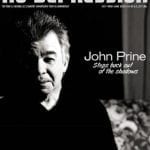William Elliott Whitmore – This land is his land
While Iowa City may think of William Elliott Whitmore as a local musician, the artist’s true home lies in a land divorced from place and time. Plainly speaking, Whitmore lives two hours south of town, curiously removed from the Iowa of modern combines, hemi-suped pickups and mainstream country radio. Whitmore, like a polytheistic Faulkner, sings of the land shouldering his family farm as if it were a whiskey-stained bit of Appalachia, soaked in the Mississippi River and wrung out over his native Lee County.
On his new Southern Records disc Ashes To Dust, Whitmore, 26, takes a gothic, existential romp past roadside flowers, creaking oaks and hovering buzzards. However, the imagery which Whitmore culls with his gravely rasp are more than convenient metaphors; they’re nearly all he has left.
“This land is for me what the Black Hills are to the Lakota Indians, what Jerusalem is to the Christians, and what Nauvoo, Illinois, is to the Mormons,” Whitmore said with a chuckle. “The hills of Lee County is where I feel the best; it’s my spiritual center.”
Whitmore’s ear for music was first pricked by evening porch sessions in his teenage years with his dad playing guitar and his grandpa on banjo. Whitmore’s father, long ailing from a kidney disorder, died of cancer when William was l6. Later that year, his grandfather died. When his mother died in a motorcycle accident two years later, Whitmore was left to sing on his own.
“I was going to just either blow my brains or just write some songs,” he said, explaining that their deaths made him realize “playing was what I was really supposed to do.”
With money allotted from his mother’s life insurance, Whitmore bought a four-track and began recording on the farm, in his living room and in the fields. “All that really started the themes behind my music, you know — ‘ashes to dust,'” Whitmore says. “Just trying to create something beautiful out of something dead.”
After high school, Whitmore moved to San Francisco, where he met Jeremy Deller, a London-based author. Deller encouraged Whitmore to record a tape on his plot of land in the desert; the resulting Death Valley Sessions featured gritty acoustics interwoven with whispers of wind and intermittent rustlings. After nine months, Whitmore returned to the midwest, living in bouts on the farm and in Iowa City, where he befriended and later toured with hardcore band Ten Grand.
He got a deal with Southern for his 2003 release Hymns For The Hopeless. While Whitmore’s second release for the label may seem like a nine-part soliloquy, these songs read less as requiems or suicide letters than those on his bare, beautifully composed Southern debut. That isn’t to say Whitmore has matured; rather, these songs depict a wanderlustful traveler turned world-weary and returning home, even if that means fessing up to debts left unpaid.
In his revival of lost souls, Whitmore pens an ode to “the first transient hobo and freest man he ever met.” “My Jug (Song For Hub Cale)” tells the story of a laid-off engineer washing his face in the Mississippi and toasting the passing trains with a batch of homemade rye.
While much of his music deals with remembrance, Whitmore asserts that his dead cold loved ones will never listen. “I don’t believe in a heaven where they’re watching down from a cloud, and maybe that’s a harsh view,” Whitmore said. “I consider myself a spiritual person…but things die, and they decompose into the ground, and then the grass grows. That to me is heaven.”




